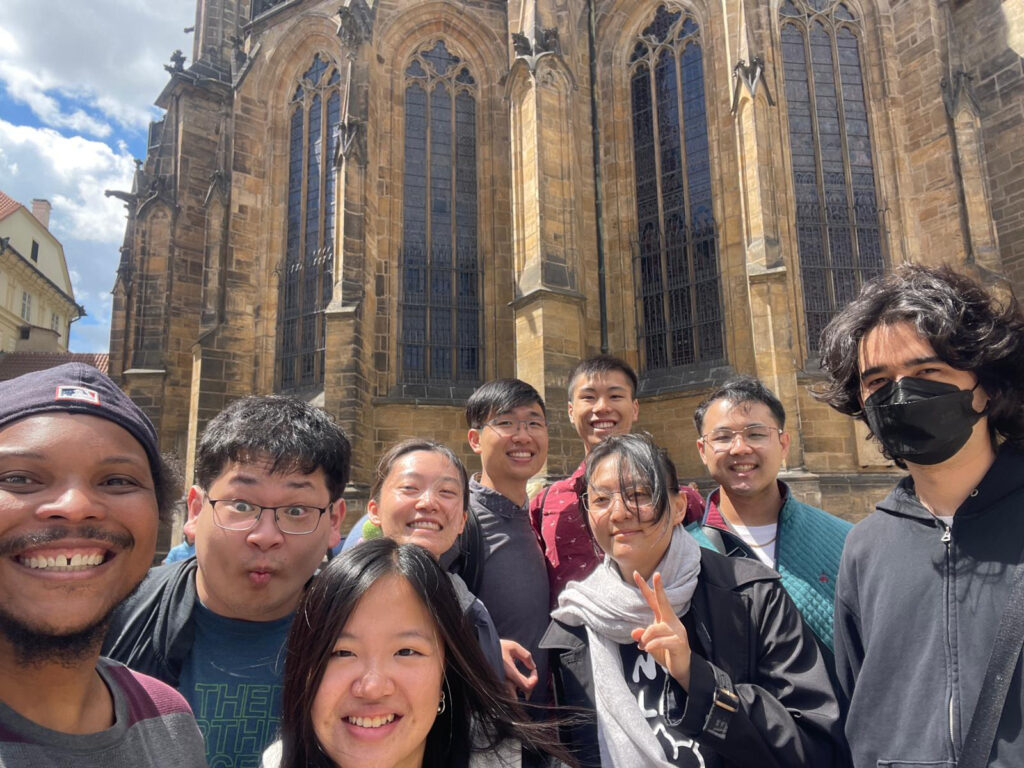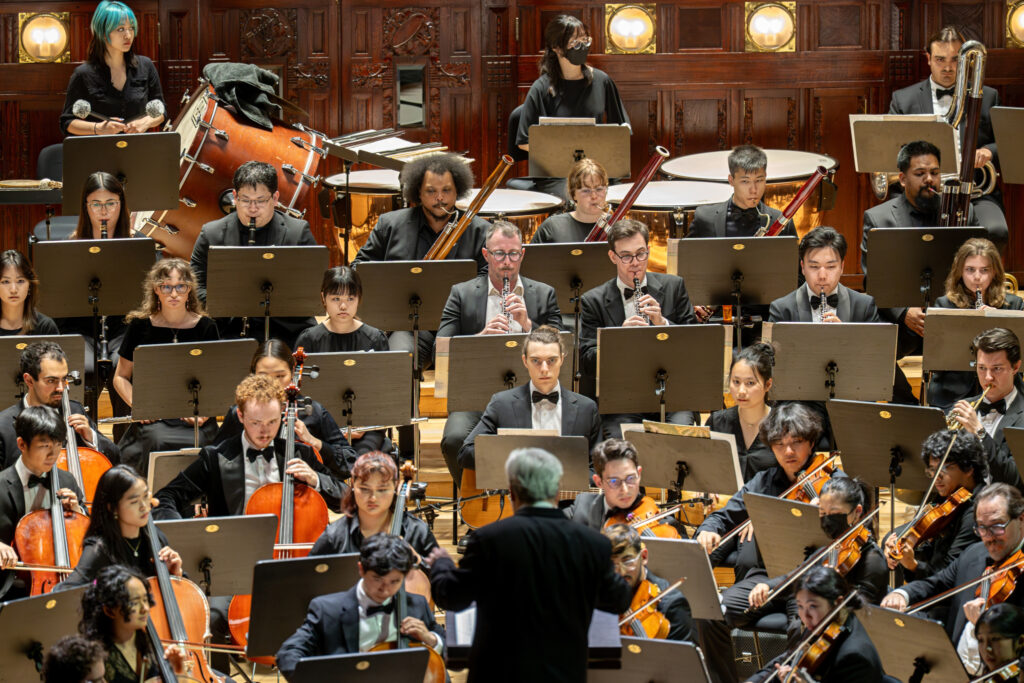"I can't believe this is real," thought Andrea Chavez as nearly 2,000 concertgoers rose to their feet and began clapping in unison. Chavez had been playing the double bass for the UC Berkeley Symphony Orchestra for two years, but this was among the most rapturous responses she'd seen from an audience yet.
The 100-person orchestra had just performed Austrian composer Gustav Mahler's sweeping and deeply emotional "Symphony No. 7" on the stage of Vienna's Musikverein, one of the most prestigious classical music venues in the world. For Chavez, playing one of her favorite composers on a stage where esteemed orchestras like the Vienna Philharmonic regularly perform was a dream come true. "I got a little teary-eyed," she confessed.
To do music in those spaces with the orchestra at the tip top of their preparation and excitement was like being on a rocket ship.
David Milnes, conductor
The performance was just one stop for the orchestra on a 10-day European tour this past May, one of several well-received tours in recent years. Before Vienna, they'd performed to sold-out audiences at top venues in Berlin and Prague, and their fourth and final concert would be in Krakow. The musicians had prepared five pieces for the tour that showcased their technical mastery and range, from Richard Strauss' 19th-century symphonic poem "Also sprach Zarathustra" to "Landscape Impression," a new piece by Chinese American composer Chen Yi. Each city's program was tailored to its audience.
The orchestra's conductor, David Milnes, who has held the position for three decades, called the experience "unimaginably exciting."
"The music was transcendent," said Milnes, chair and professor in Berkeley's Department of Music. "To do music in those spaces with the orchestra at the tip top of their preparation and excitement was like being on a rocket ship."
It was the culmination of a year and a half of preparation, including fundraising, logistics and hours upon hours of rehearsals. For these student-musicians - whom Milnes considers some of the best classical musicians at any university in the country - the tour was an unforgettable experience.

Petr Dyrc
Bouncing back, stronger than ever
When the campus pivoted to online learning at the onset of the COVID-19 pandemic, the symphony had to stop performing in person. Milnes worried that Berkeley's music program, and especially the orchestra, was in peril.
But when the music department reopened to in-person instruction in fall 2021, students came flooding back in. Turns out, they'd been practicing at home, biding their time until they could play together again.

Petr Dyrc
Bassoonist Donez Horton-Bailey, a Ph.D. student in physics who has played with the Symphony Orchestra since 2018, remembers the time well. "I love playing in an ensemble," he said. "We were all itching to get back into the hall to rehearse together and play together."
Today, Milnes said the orchestra is "absolutely booming." Berkeley now has two full orchestras - the Symphony Orchestra and the Philharmonia Orchestra - each with waiting lists, and the number of music majors at Berkeley has tripled to become the school's fastest-growing major.
Since Natasha Tjeng, a double-major in music and chemical biology, joined the Symphony Orchestra as a violinist in 2023, she continues to be stunned at the advanced level of programming they tackle each semester.
Growing up in Singapore, Dubai and the Philippines, Tjeng has played with various orchestra programs, but she'd never rehearsed and performed with a group so consistently dedicated to elevating their craft until she got to Berkeley.

Courtesy of the UC Berkeley Symphony Orchestra
"We play music that professional orchestras think twice about programming," she said. "And everybody wants to be here. I've never met anybody who doesn't. I think that's why we're able to have so many concerts and do so much crazy stuff."
It's that "crazy stuff" that Milnes loves the most. In addition to traditional classical programming, which he solicits the orchestra's opinions on - "it'll sound better if they like it," he said - Milnes chooses a selection of new music every year to stretch the musicians' artistry. Composed by artists from all over the world, including by Berkeley faculty and students, these contemporary pieces involve all kinds of experimentation. Some call for extended techniques, like biting the reed of a wind instrument to produce unusual harmonics. Others play with tempo and rhythm and melody. A few recent pieces have included live electronic technology designed at Berkeley's Center for New Music and Audio Technology.

Petr Dyrc
"It's very hard to play new music because there's often no precedent," said Tjeng. "Sometimes, we only have one or two recordings of what it's supposed to sound like, so we have to figure it out as we go."
While it can be frustrating for musicians accustomed to a particular sound or way of playing, admits Milnes, it's this struggle - when a group is forced to make their way through the weeds of a piece until they come to a collective understanding - that he believes leads to their growth as artists.
"There are all kinds of creative artists all over the place that want to do new things and express themselves," said Milnes, "and it is really fun to take part in it. I think it's part of the spiritual and intellectual development of being a musician.
"We aim to have a wide array of experiences. It takes a bit of courage and industriousness to have a commitment to do that, but it is really rewarding when we succeed at capturing the interest of the audiences."
It's this steadfast dedication to working hard, together as a team, and being open-minded that Milnes said will prepare the student-musicians for any career they decide to pursue.
Prepared for any career path
The orchestra's European tour was a year and a half in the making. Students played many roles in the process, beginning with raising funds to cover the group's travel costs by establishing relationships with audience members, and explaining the vital importance of orchestra to public education and the Bay Area community. They also took part in choosing the repertoire and venues, managing the orchestra's finances and directing the marketing campaign that brought in full houses.
It was my first time in Europe. Even the small things, like walking outside, I just felt so appreciative to be there.
Andrea Chavez, third-year student and double bass player
This self-advocacy is a skill that Milnes said students will be able to use throughout their lives, especially as musicians. "It's another part of the educational experience," he said. "If you want something to happen, you have to make it happen yourselves, as a community."
Students were also responsible for tasks during the tour, like arranging buses between cities, packing the sheet music and setting up and breaking down the stages before and after their concerts. "It felt professional," said Horton-Bailey, "like we were important."
While many students in the orchestra go on to have successful careers in music, others explore different professional avenues. For instance, after earning his Ph.D. in physics, Horton-Bailey plans to become a professor or work in industry as a researcher.

Petr Dyrc
"Music is its own very special joy and a way of expression, but it's also one of the greatest ways to develop as a person and develop the brain," said Milnes. It not only requires an individual commitment over a long period of time, he said, but it also builds skills in teamwork and performing under pressure. "Our program trains professional musicians, but it also trains the people who play at the same high level to go on to be surgeons and engineers and scientists and scholars of all kinds."
Horton-Bailey would also love to continue playing bassoon for Berkeley's Symphony Orchestra, joining a handful of alumni who play with the student-musicians.
"Turns out getting a Ph.D. in physics is really hard," he laughed. "I've been a musician way longer than I've been a physicist. Music is what I go to when I'm stressed, when I need a break from science. It's so important for clearing my head."
Chavez, who plans to pursue a career in veterinary medicine after she graduates in two years, echoes the sentiment. "I'll play the double bass forever," she said. "I love that instrument with all my heart."
Regardless of the career path the student-musicians follow, there's no doubt that the Symphony Orchestra will have played a role in getting them there.

Petr Dyrc






